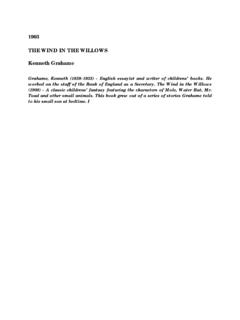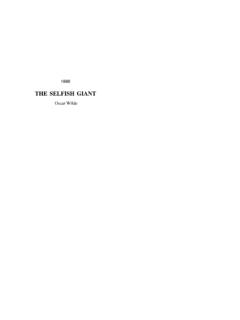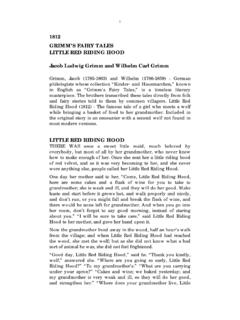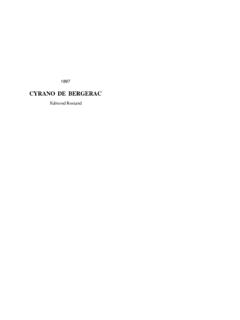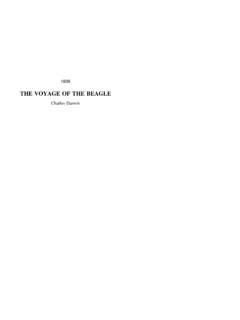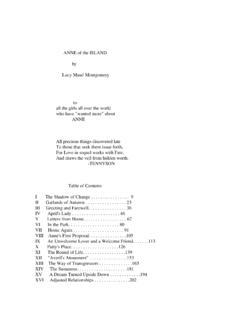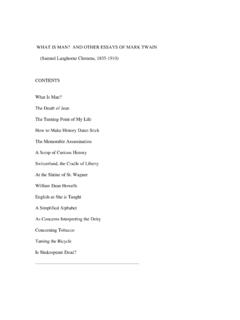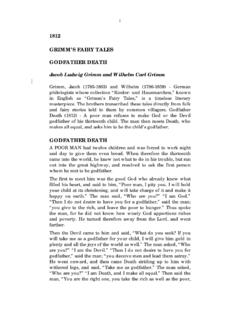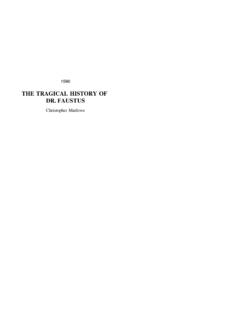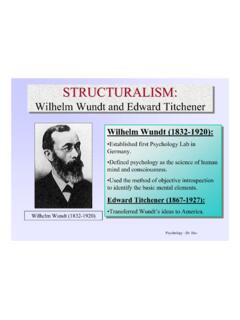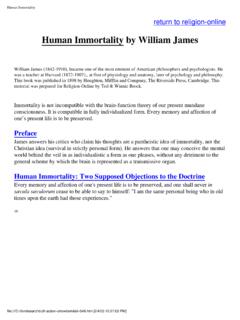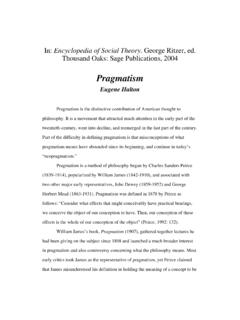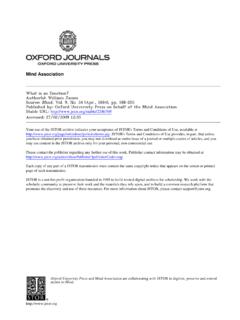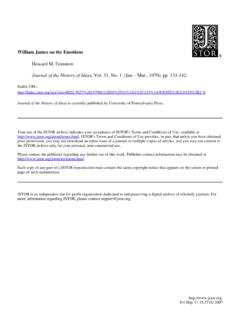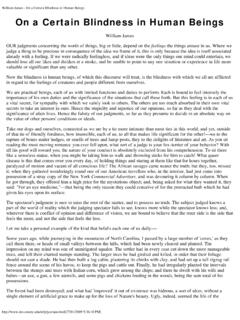Transcription of THE V ARIETIES OF RELIGIOUS EXPERIENCE
1 1902 THE VARIETIES OF RELIGIOUS EXPERIENCEW illiam JamesJames, william (1842-1910) - American psychologist, philosopher, andphysiologist. The brother of Henry james . He taught at Harvard (from 1872) andwrote a number of works on psychology, theology, ethics and metaphysics. TheVarieties of RELIGIOUS EXPERIENCE (1902) - Culled from a series of lectures pre-sented by james as Gifford Lecturer at the University of Edinburgh. He concludesthat any article of RELIGIOUS faith that provides inspiration and emotional satisfac-tion is true. Table Of ContentsTHE VARIETIES OF RELIGIOUS EXPERIENCE .. 6A STUDY IN HUMAN NATURE .. 6 PREFACE .. 7 LECTURE IRELIGION AND NEUROLOGY .. 9 LECTURE IICIRCUMSCRIPTION OF THE TOPIC .. 39 LECTURE IIITHE REALITY OF THE UNSEEN .. 70 LECTURES IV AND VTHE RELIGION OF HEALTHY-MINDEDNESS .. 102 LECTURES IV AND VAPPENDIX .. 161 LECTURES VI AND VIITHE SICK SOUL .. 166 LECTURE VIIITHE DIVIDED SELF, AND THE PROCESS OF ITS UNIFICATION.
2 213 LECTURE IXCONVERSION .. 245 LECTURE XCONVERSION- Concluded .. 280 LECTURES XI, XII, AND XIIISAINTLINESS .. 334 LECTURES XIV AND XVTHE VALUE OF SAINTLINESS .. 423 LECTURES XVI AND XVIIMYSTICISM .. 484 LECTURE XVIIIPHILOSOPHY .. 554 LECTURE XIXOTHER CHARACTERISTICS .. 590 LECTURE XXCONCLUSIONS .. 625 POSTSCRIPT .. 671 THE VARIETIES OF RELIGIOUS EXPERIENCEA STUDY IN HUMAN NATUREB eing the Gifford Lectures on Natural ReligionDelivered at Edinburgh in 1901-1902 PREFACETHIS book would never have been written had I not been honored with an ap-pointment as Gifford Lecturer on Natural Religion at the University of Edin-burgh. In casting about me for subjects of the two courses of ten lectures each forwhich I thus became responsible, it seemed to me that the first course might wellbe a descriptive one on Man s RELIGIOUS Appetites, and the second a metaphysi-cal one on Their Satisfaction through Philosophy. But the unexpected growth ofthe psychological matter as I came to write it out has resulted in the second sub-ject being postponed entirely, and the description of man s RELIGIOUS constitutionnow fills the twenty lectures.
3 In Lecture XX I have suggested rather than statedmy own philosophic conclusions, and the reader who desires immediately toknow them should turn to the Conclusions, and to the Postscript of the book. Ihope to be able at some later day to express them in more explicit my belief that a large acquaintance with particulars often makes us wiserthan the possession of abstract formulas, however deep, I have loaded the lectureswith concrete examples, and I have chosen these among the extremer expressionsof the RELIGIOUS temperament. To some readers I may consequently seem, beforethey get beyond the middle of the book, to offer a caricature of the subject. Suchconvulsions of piety, they will say, are not sane. If, however, they will have the pa-tience to read to the end, I believe that this unfavorable impression will disappear;for I there combine the RELIGIOUS impulses with other principles of common sensewhich serve as correctives of exaggeration, and allow the individual reader todraw as moderate conclusions as he thanks for help in writing these lectures are due to Edwin D.
4 Starbuck, ofStanford University, who made over to me his large collection of manuscript ma-terial; to Henry W. Rankin, of East Northfield, a friend unseen but proved, towhom I owe precious information; to Theodore Flournoy, of Geneva, to CanningSchiller, of Oxford, and to my colleague Benjamin Rand, for documents; to mycolleague Dickinson S. Miller, and to my friends, Thomas Wren Ward, of NewYork, and Wincenty Lutoslawski, late of Cracow, for important suggestions andadvice. Finally, to conversations with the lamented Thomas Davidson and to theuse of his books, at Glenmore, above Keene Valley, I owe more obligations than Ican well UNIVERSITY,March, IRELIGION AND NEUROLOGYIT is with no small amount of trepidation that I take my place behind thisdesk, and face this learned audience. To us Americans, the EXPERIENCE of receiv-ing instruction from the living voice, as well as from the books, of Europeanscholars, is very familiar. At my own University of Harvard, not a winter passeswithout its harvest, large or small, of lectures from Scottish, English, French, orGerman representatives of the science or literature of their respective countrieswhom we have either induced to cross the ocean to address us, or captured on thewing as they were visiting our land.
5 It seems the natural thing for us to listenwhilst the Europeans talk. The contrary habit, of talking whilst the Europeans lis-ten, we have not yet acquired; and in him who first makes the adventure it begetsa certain sense of apology being due for so presumptuous an act. Particularlymust this be the case on a soil as sacred to the American imagination as that of Ed-inburgh. The glories of the philosophic chair of this university were deeply im-pressed on my imagination in boyhood. Professor Fraser s Essays in Philosophy,then just published, was the first philosophic book I ever looked into, and I wellremember the awe-struck feeling I received from the account of Sir william Ham-ilton s class-room therein contained. Hamilton s own lectures were the first philo-sophic writings I ever forced myself to study, and after that I was immersed inDugald Stewart and Thomas Brown. Such juvenile emotions of reverence neverget outgrown; and I confess that to find my humble self promoted from my nativewilderness to be actually for the time an official here, and transmuted into a col-league of these illustrious names, carries with it a sense of dreamland quite asmuch as of since I have received the honor of this appointment I have felt that itwould never do to decline.
6 The academic career also has its heroic obligations, soI stand here without further deprecatory words. Let me say only this, that nowthat the current, here and at Aberdeen, has begun to run from west to east, I hopeit may continue to do so. As the years go by, I hope that many of my countrymenmay be asked to lecture in the Scottish universities, changing places with Scots-men lecturing in the United States; I hope that our people may become in all thesehigher matters even as one people; and that the peculiar philosophic temperament,as well as the peculiar political temperament, that goes with our English speechmay more and more pervade and influence the regards the manner in which I shall have to administer this lectureship, Iam neither a theologian, nor a scholar learned in the history of religions, nor ananthropologist. Psychology is the only branch of learning in which I am particu-larly versed. To the psychologist the RELIGIOUS propensities of man must be at leastas interesting as any other of the facts pertaining to his mental constitution.
7 Itwould seem, therefore, that, as a psychologist, the natural thing for me would beto invite you to a descriptive survey of those RELIGIOUS the inquiry be psychological, not RELIGIOUS institutions, but rather religiousfeelings and RELIGIOUS impulses must be its subject, and I must confine myself tothose more developed subjective phenomena recorded in literature produced byarticulate and fully self-conscious men, in works of piety and autobiography. In-teresting as the origins and early stages of a subject always are, yet when oneseeks earnestly for its full significance, one must always look to its more com-pletely evolved and perfect forms. It follows from this that the documents thatwill most concern us will be those of the men who were most accomplished in thereligious life and best able to give an intelligible account of their ideas and mo-tives. These men, of course, are either comparatively modern writers, or else suchearlier ones as have become RELIGIOUS classics. The documents humains which weshall find most instructive need not then be sought for in the haunts of special eru-dition- they lie along the beaten highway; and this circumstance, which flows sonaturally from the character of our problem, suits admirably also your lecturer slack of special theological learning.
8 I may take my citations, my sentences andparagraphs of personal confession, from books that most of you at some time willhave had already in your hands, and yet this will be no detriment to the value ofmy conclusions. It is true that some more adventurous reader and investigator, lec-turing here in future, may unearth from the shelves of libraries documents thatwill make a more delectable and curious entertainment to listen to than mine. YetI doubt whether he will necessarily, by his control of so much more out-of-the-way material, get much closer to the essence of the matter in question, What are the RELIGIOUS propensities? and the question, What istheir philosophic significance? are two entirely different orders of question fromthe logical point of view; and, as a failure to recognize this fact distinctly maybreed confusion, I wish to insist upon the point a little before we enter into thedocuments and materials to which I have recent books on logic, distinction is made between two orders of inquiryconcerning anything.
9 First, what is the nature of it? how did it come about? whatis its constitution, origin, and history? And second, What is its importance, mean-ing, or significance, now that it is once here? The answer to the one question isgiven in an existential judgment or proposition. The answer to the other is aproposition of value, what the Germans call a Werthurtheil, or what we may, if welike, denominate a spiritual judgment. Neither judgment can be deduced immedi-ately from the other. They proceed from diverse intellectual preoccupations, andthe mind combines them only by making them first separately, and then addingthem the matter of religions it is particularly easy to distinguish the two orders ofquestion. Every RELIGIOUS phenomenon has its history and its derivation from natu-ral antecedents. What is nowadays called the higher criticism of the Bible is onlya study of the Bible from this existential point of view, neglected too much by theearlier church. Under just what biographic conditions did the sacred writers bringforth their various contributions to the holy volume?
10 And what had they exactlyin their several individual minds, when they delivered their utterances? These aremanifestly questions of historical fact, and one does not see how the answer tothem can decide offhand the still further question: of what use should such a vol-ume, with its manner of coming into existence so defined, be to us as a guide tolife and a revelation? To answer this other question we must have already in ourmind some sort of a general theory as to what the peculiarities in a thing shouldbe which give it value for purposes of revelation; and this theory itself would bewhat I just called a spiritual judgment. Combining it with our existential judg-ment, we might indeed deduce another spiritual judgment as to the Bible s if our theory of revelation-value were to affirm that any book, to possess it,must have been composed automatically or not by the free caprice of the writer,or that it must exhibit no scientific and historic errors and express no local or per-sonal passions, the Bible would probably fare ill at our hands.
